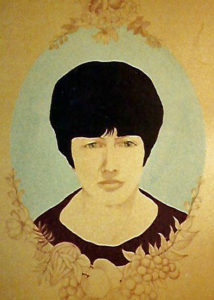Garret Keizer is a widely published essayist, former Episcopal priest and English teacher, and the author of eight books. His nonfiction works Help: The Original Human Dilemma (HarperOne, 2004) and The Enigma of Anger: Essays on a Sometimes Deadly Sin (Jossey-Bass, 2004) were both transformative and comforting for me during a fraught period in my life. His nuanced meditations on what we owe each other gave me permission to feel all my feelings about a family situation that in the end, I could not resolve, only walk away from. Now, at age 65, he has released his debut poetry collection, The World Pushes Back (Texas Review Press, 2019), winner of the 2018 X.J. Kennedy Award.
Critics often compliment a book by calling it “ambitious”, but such an ego-driven word would be untrue to the spirit of this collection–audacious as it is to be a progressive Christian moralist in a culture where hard-hearted reactionaries claim a monopoly on faith. As he says in the closing poem, “The Last Man Who Knew Everything”:
In the best world every man
would know everything
that was worth knowing
and would know that others knew
as well as he, and would also know
that things worth knowing are few.
Keizer gently but pointedly warns his fellow American bourgeoisie not to mistake the contentment of privilege for true happiness, the latter requiring the soul-searching and pain of being born again into a humbler interconnectedness to others. This vision is embodied in “Cousin Rick”, a real-life example of Henri Nouwen’s ideal of “downward mobility”. Not spoiling the tale with any heavy-handed “Go and do likewise,” Keizer recounts the bare facts of his cousin’s life and death as a missionary in New Guinea, with affection and quiet bewilderment at the saints hidden among us.
Since reading this book, I’ve been conducting an argument in my mind with the poem “For Those Who Talk of Growth”. The speaker, at the start of spring, is clearing his lawn of the sand that the snowplow threw there in the winter, and a perhaps-too-facile metaphor comes to him:
The sand is what served me
for a time, some friend, some
creed that gave me traction
once, but now only burdens
the life I must rake free of it.
However, he immediately corrects himself. Snow will inevitably come again “and I shall go/nowhere without the sand.”
Certainly there are many who worship modernity for its own sake and think themselves clever for upgrading their creeds like new iPhones. I’ve confronted this bias in liberal Christians’ dismissal of the supernatural. But this poem rubbed me the wrong way, because it echoes a common threat leveled against us former Christians: “just you wait, when things get tough, you’ll come crawling back.” For some of us, the sand became quicksand. We didn’t leave because we thought life was easy, we left (or were kicked out) because the old answers were inadequate to meet the revelatory crisis that split our lives into before and after. It actually takes a lot of maturity to look back and admit that the sand did serve us for a time, and be grateful rather than bitter as we say goodbye.
The rabbis say that a person should carry two notes in their pockets: one, “The world was created for me,” and the other, “I am dust and ashes.” A similar balance is at play in the poem “Divine Comedy” (below), which expresses the exquisite difficulty of creating art with a mindset of gratitude rather than scarcity. Transcending praise and blame is a daily spiritual discipline where I often fall short.
The poems below are reproduced with permission from Texas Review Press (Huntsville, TX), copyright Garret Keizer.
THE STARS ARE NEAR
The stars are near,
and it struck me how near
tonight, how superstitious I have been
to take their exponential distances on faith,
like a man dubious about driving a nail
because he’s heard of empty space
between the molecules
in the hammer’s head.
They are near, the stars.
They will always be
near. I have neighbors
whose porch lights are more distant.
A man who believes himself estranged
from his father, because they quarreled
when he was young,
sees the day when he is no longer
young, and no longer estranged,
and no more distant from the nearest star
than from his final breath.
He vows, as I do,
that he will not have his distances
dictated to him any more.
****
DIVINE COMEDY
1.
Hell is eternal publication.
The damned never write a word
except their names at book signings,
never read anything but reviews
of books they can’t remember writing.
They are stuck on the radio for ages,
talking about their goddamn books—
so long they forget they’re on the air.
They call themselves on the call-in line
and ask, “So how did you get published?”
2.
Heaven is eternal publication.
The redeemed never write a word
not quickened by their inscribing:
“For Jane Doe, who graced this event,
and is the truth I sought by writing.”
They are guests on the radio for ages,
talking to God, who just loved the book—
so long they forget they’re on the air.
Again they drift to ground and find
their first acceptance, too good to be true.
